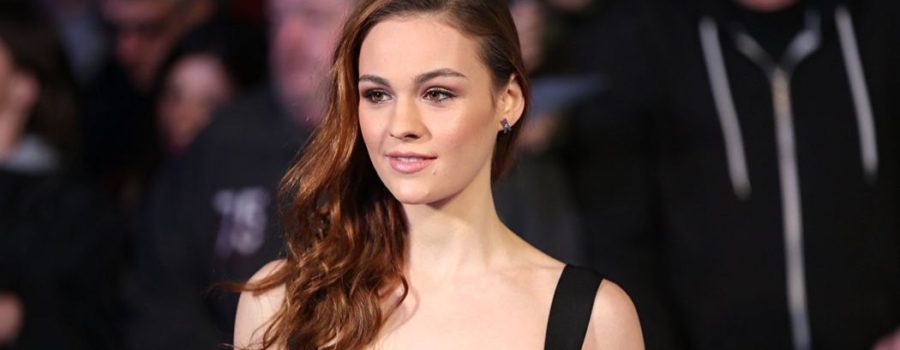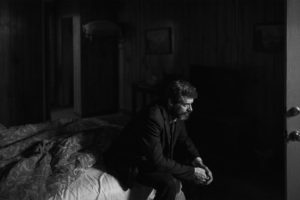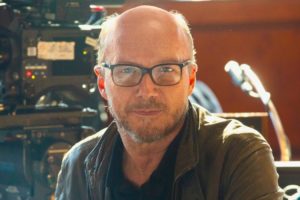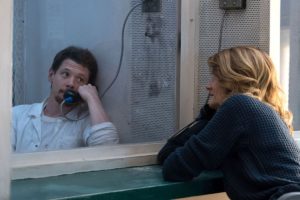[Published at Film Inquiry] Audiences may most notably recognize Sophie Skelton as Brianna from the Starz hit television series Outlander. However, since the Cheshire, UK native transitioned from ballet, to stage, to screen, she has been turning heads, starring in critically acclaimed projects such as The War I Knew, Ren, and Another Mother’s Son. Skelton‘s latest film, 211, is based on the The Battle of North Hollywood in 1997, a bank robbery-turned-police shootout.
The standard issue 9mm pistol, .38 special revolver sidearms, and 12-gauge shotguns that the police used were no match for the robbers’ fully automatic weapons. With nearly 2,000 rounds of ammunition fired, the two perpetrators killed, twelve police officers and eight civilians injured, it is one of the longest and bloodiest events in American police history. The event launched a nationwide debate pushing for for more heavy weaponry integrated into police forces across America in the case of a similar event in the future.
In this present-day reimagining, Skelton plays Lisa, the daughter of Officer Mike Chandler (Nicolas Cage) and fiancé of his police partner, Officer Steve MacAvoy (Dwayne Cameron). On a fateful day, Chandler and MacAvoy take a bullied kid named Kenny (Michael Rainey Jr.) on a ride along. As her father and fiancé encounter militant bank robbers, Skelton‘s Lisa watches they put their lives in danger.

Sophie Skelton – source: Sony Pictures
Alex Arabian for Film Inquiry: I really enjoyed your performance in your new film, 211.
Sophie Skelton: Yeah? Well, thank you for calling today.
Yeah, absolutely. What stood out to you initially while reading the script?
Sophie Skelton: So, initially, it was actually Jonathan Yunger. He’s one of the producers of the film, and I’ve worked with him before on a film. So, they asked me to do the role and see what I thought of it. So, I had to read the script, and I think what stood out for me was the fact that it’s based on a true historical event, and actually one of the bloodiest events in history, which, interestingly enough, because we have a huge amount of, of platforms over here in England, not many people have really heard of the Hollywood Bank Robbery, and quite how bloody and brutal it was, and quite how it did change the course of history in terms of officers carrying different types of firearms. But I think what I liked about the script was that it took that story and made it a modern day version. You have Michael Rainey Jr.‘s character in the back of a cop car on his phone, and it sort of shows how that kind of historical event could be influenced by mobile phones in a different way.
And I think it’s just a really great story to be told; and I think the wonderful thing is that we have it from so many different points of view. You have a young boy in the car who is the innocent person, and then you have the cops who are doing their job, you have the robbers who almost have their own reasons for doing what they’re doing, and then you have Lisa, which – that was a really wonderful character, because she’s our way of seeing a really, well, sort of publicized event through the victim’s eyes.
You and Dwayne Cameron have fantastic onscreen chemistry. How did you two prepare for your roles?
Sophie Skelton: Well, good, thanks, because we actually were quite thrown into it. We sort of met on the day of filming actually. We didn’t even meet at base, we met on the set. We were sort of just a quick handshake and then straight on. And the first scene that we actually filmed was the scene where Lisa finds out that she’s pregnant and tells him. So it was great, yeah. I just got on with Dwayne straight away. He’s just a lovely guy and really natural as well in terms of in the job, so it was just wonderful to work with him. He’s very in the moment.
So, we kind of very quickly talked about the backstory of the couple, how long we’ve been together, how much we’ve tried to sort of patch the relationship between Lisa and her father, Nick Cage‘s character. And we also wanted to make sure that we played it as if we’d sort of been trying for a baby for a long time, just so the events of the day really are even more hard hitting that they’ve finally got this good news, and then their world is just shaken in one day.
What was your experience like working with such a powerhouse actor like Nicolas Cage?
Sophie Skelton: It was great. He’s very “what you see is what you get.” He’s really lovely and he’s very calm. He’s a very wise man; he actually has a lot to say, but he does sometimes come across as quite reserved onscreen. But then, when he really wants to show an emotion, he really can. He’s just lovely to chat to. He’s really welcoming, really warm, and, again, just a really easy man to work with, both on and off screen. Because, in terms of in a scene, he’s just very in the moment, and it means everything runs really smoothly, so it was great, yeah. [It was] really good to work with him because he’s done so many movies, now, that you just trust that he’s such a well-oiled machine in himself, that you can just kind of go along with that which is really great.

Cage in 211 – source: Millennium Films
Including 211, you’ve received a lot of great, substantive roles over the past couple of years in projects such as Ren, Outlander, Another Mother’s Son, and Day Of The Dead: Bloodline. Do you prefer working on larger budget films or TV shows, or more smaller, intimate, independent projects?
Sophie Skelton: That’s a good question. I think the independent projects that I’ve done have been wonderful, because everybody is really in it for the art because, as you say, it’s low budget – it’s not always spectacularly organized; it just means that you’re really in it for the work, which is wonderful. But then, I have to say with 211and Day Of The Dead, that’s the same production company, and it’s really become quite a family now.
Everybody is wonderful, the crew are wonderful, and everybody knows each other really well, and it sort of feels like coming home on set in Bulgaria. So, for that reason I definitely prefer doing that, just because it’s so comfortable.
Did you receive a formal acting education, or was your learning of the craft more hands-on?
Sophie Skelton: Yeah, my learning was a bit more hands on. I actually started doing ballet from the age of three. I used to go every day, so I used to train a lot doing that. And then, from there, I ended up doing sort of ballet shows and a lot of musical theater, and I did a lot of stage work. But then I always wanted to do film and TV, just because it’s a lot more discrete in terms of how you’re acting it. You’re not having to make a big act for a huge audience.
So, I sort of moved into that when I was about 14, 15. And then I got my first job, and I just sort of continued, and I didn’t really want to put off work by going to drama school. So, I sort of just learned on the job and wanted to build up my CV more than anything and just actually get out there and get my hands dirty by being on set, as opposed to just being in a classroom environment kind of thing. So yeah, [I] just did it that way.
You started out as a dancer. Do you notice any similarities in the two art forms, and how has dance helped you develop your acting skills?
Sophie Skelton: It’s funny, actually, often I do think about how it helps in ways that I never realized. Even just in terms of stamina. I mean, filming days are so long and intense and happen over and over and over again, and that’s one thing with ballet that you really do learn. It becomes a very second nature thing to have a good stamina, not only in terms of actual fitness, but also you have to have a poker face when you’re on stage. No matter how tired you are or ready to drop, you have to sort of show that you’re enjoying it and that you’re fine. Also, with ballet, a lot of what you do is unspoken, so everything that you express is through your body, but also through your face, so I think that’s really important.
Also, in terms of choreography, you have to be very good and very fast at picking up choreography, and then that helps on set too, because sometimes when you’re doing a scene, you have to plot where you’re gonna move, or you have to pick up things at the same time that you did in the last take for continuity. So it’s really good to have that ballet behind you because it really does help in terms of expressing things through your body movement, also in terms of stamina and muscle memory, remembering when you did something and at what point and in what way.
You’re currently filming season four of Outlander. What can you say about the new season?
Sophie Skelton: So, the new season, it’s based on the American Revolution – well, just before the American Revolution. So, it shows the New World, it shows trying to survive being in the New World. Because Brianna is in the 1970s, she’s sort of dealing with the effects of sending her mother back in time. So, she’s potentially just become an orphan. She’s just nervous she’ll never see her mother again. And so she waits. But then, Brianna finds a newspaper article from the 1700s saying that her mother and father died in a fire. So, she goes back in time to sort of try to change the course of history and save their lives. And then, we really just see the season through Brianna’s eyes in terms of the modern woman being thrown back into history and to a time period where it kind was a free-for-all.
There is this wonderful element of people from all over the world, culture’s colliding. But at the same time, there wasn’t a particular law enforcement as strongly as it would be in the ’70s America. And so, you see this complete opposite version of what America was, in terms of criminals, and Brianna definitely suffers the brunt of the criminal action that took place at the time. So, it’s great to see the new season. Again, like we did with Claire in season one, you’re seeing a modern woman going back into a great period of history, but how that period doesn’t have such a great effects on her, individually.
Film Inquiry would like to thank Sophie Skelton for her time and insight. 211 was released theatrically and on VOD on June 8, 2018.








Leave a Reply
Your email is safe with us.